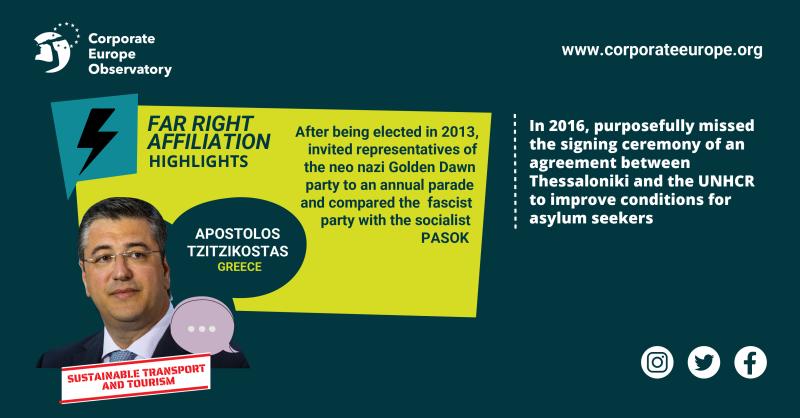Stay always informed
Interested in our articles? Get the latest information and analysis straight to your email. Sign up for our newsletter.

Apostolos Tzitzikostas, New Democracy party, part of EPP

Tzitzikostas is Governor of Central Macedonia and former President of the EU Committee of the Regions (Politico). The “a 45-year-old economist and political scion – his late father was an MP and minister – has been governor of Central Macedonia since January 2013 (source).
The Greek government said that Tzitzikostas’ selection “highlights the importance of Macedonia and northern Greece for Europe, as a region with a strategic location, interconnectivity and geopolitical importance both for the Balkans and South-Eastern Europe, and as the north-eastern edge of the Mediterranean” (Politico).
Tzitzikostas has three times been elected as governor of Central Macedonia with more than 50% of the vote, and has been a member of the EU’s Committee of the regions since 2015, holding the position of vice-president and then president from 2020 until 2022. He has a degree in Economics and Public Policy from the University College of London, and his background includes working for the US House Committee on Foreign Affairs while attending Georgetown University, and founding an organic dairy company in Greece (Euronews)
Tzitzikostas, as governor, “is popular in Central Macedonia, where the ruling New Democracy suffered significant losses to the far-right in the June 9 elections for the European Parliament. Tzitzikostas is known to be popular with the kind of populist right supporters who defected from New Democracy” (source). After his first election as governor in 2013, Tzitzikostas’ “invitation of Golden Dawn party representatives to the annual 28 October Ohi Day parade drew nationwide criticism, including from his own party, and his following comparison of the fascist party with the socialist PASOK caused even more anger” (source). In 2016, at the height of Europe’s migration crisis, “Tzitzikostas abstained from the signing ceremony of a cooperation agreement between Thessaloniki and the UNHCR to improve conditions for asylum seekers”, and after the European elections in June 2024 Greek media even “suggested he might defect and create a new party, forming a “League of the North” that could galvanize the fringe vote on the right” (Politico).
New Democracy is a liberal-conservative centre-right to right-wing party (source), in power since July 2019 under Prime Minister Kyriakos Mitsotakis, who was re-elected with an outright majority in June 2023, promising to “transform Greece with dynamic growth rates that will raise wages and reduce inequalities” – ie “investor-friendly reforms” - an election outcome “considered market-friendly” and putting Greece “firmly on track to regain an investment-grade rating” (Politico).
Mitsotakis’ government has faced mounting criticisms from press freedom and human rights groups on rule-of-law issues, with multiple “allegations that the government has targeted or failed to protect journalists, activists and human rights campaigners from attacks using spyware, coercive law suits, and obstructive regulations”, which the PM has called a “slander campaign”, citing Greece’s recent adoption of same-sex marriage legislation and plans to introduce a postal vote “as evidence of the country’s improving record” (APNews). A February 2024 European Parliament resolution called out the Greek government over media freedom, spyware, police violence, mistreatment of migrants, attacks against civil society and alleged corruption (EP and Euronews).
On climate, the Mitsotakis government has a mixed record: strong words on the severity of the climate crisis, banning coal-power (but only from 2028) (Reuters), to facing criticism of its handling of Greek wildfires and flooding (Euronews) to claiming that “Climate change is an opportunity to expand the tourism season” in Greece (Bloomberg).